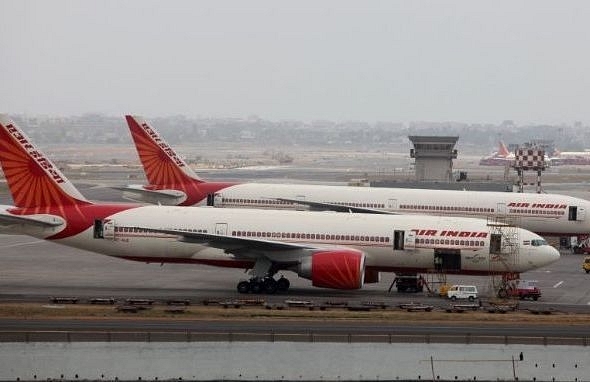Business
Challenge For Government Is To Sell Air India At A Time When Travel Sector Is Reeling Under Historic Low
- With the private sector, globally, in the doghouse, the scope of privatisation of PSUs right now is not too bright.
- But the moment the economy picks up, shedding of government flab should be of utmost priority.

Air India aircraft are seen parked on the tarmac of the international airport in Mumbai. (Sattish Bate/Hindustan Times via Getty Images)
There have been fresh calls for a greater push towards disinvestment and privatisation. This has come along with the call for further reforms that will make the Indian economy more competitive and unleash our productive potential.
Regular readers are aware of my staunch belief in privatisation and disinvestment as it restricts the role of the public sector in the economy.
There is enough evidence of successful privatisation in the past which has resulted in huge revenue for the government in the form of higher taxes.
Therefore, getting rid of public sector enterprises ensures a change in the fundamental nature of the firm.
This happens as private players are often motivated by profits; they bring about a management change and make the enterprise more efficient.
On the other hand, continuing to run public sector units results in a situation like Air India or the state-owned telecom companies (MTNL and BSNL). That is, these companies continue to make losses, accumulate debt, becoming a burden on the taxpayer.
There are a few profit-making PSEs as well. However, they are either in sectors where there is limited private competition or else, they are exceptionally professionally managed enterprises which are indeed exceptions when compared to the overall public sector.
As important as the disinvestment and privatisation of these PSUs is, we must also confront the reality of our economic situation. That is, our private sector is witnessing one of the worst economic shocks which has severely constrained its ability to make investments or acquire PSEs.
This makes the goal of privatisation all the more difficult, especially when it comes to companies like Air India, as civil aviation across the world is unlikely to restore to normalcy anytime in the near future.
This means that we will have to be creative when it comes to disinvestment in the given financial year, as our privatisation plans are likely to be deferred by a few years due to lack of potential buyers.
It may be the case that we can find buyers for companies such as Air India even at such turbulent times. Considering the debt of the company, and the annual losses, getting rid of it even for a small token amount would be a big favour to taxpayers, who have largely kept the company running despite its excesses.
There has been an argument lately that we need Air India as it helps during rescue operations, but any other private airline could also do the same at half the cost to the taxpayers.
At some point, the government and the CAG will have to revisit their notions of accountability of public money.
This is relevant more for the CAG, as any sale of Air India at a token amount would be met with a flurry of objections and nitpicking.
One hopes that with a mandate of 303, the government is bold enough to address the challenges associated with privatisation and disinvestment, just as it addressed historic issues such as Article 370 and the CAA.
More immediate, however, is a lesson for our administration, especially the permanent executive as it must recognise the need and urgency for privatisation (and disinvestment).
It was far easier to push for the same in years preceding Covid-19, and that it got delayed is an important issue that needs to be dealt with as every successive day leads to more losses and higher debt, which in turn only reduces the value which could have been extracted by selling the stake of the government.
As the government gets ready to announce a new public enterprise policy, there is hope that some of these issues will also be dealt with and that once market conditions improve, there is an attempt to privatise (and disinvest) on a war footing.
Doing so will not just generate revenue for the government but yield rich efficiency gains for the economy and create an overall positive sentiment.
Introducing ElectionsHQ + 50 Ground Reports Project
The 2024 elections might seem easy to guess, but there are some important questions that shouldn't be missed.
Do freebies still sway voters? Do people prioritise infrastructure when voting? How will Punjab vote?
The answers to these questions provide great insights into where we, as a country, are headed in the years to come.
Swarajya is starting a project with an aim to do 50 solid ground stories and a smart commentary service on WhatsApp, a one-of-a-kind. We'd love your support during this election season.
Click below to contribute.
Latest